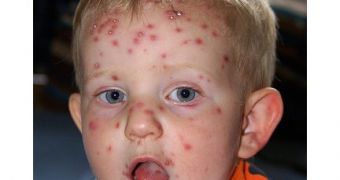A new study carried out by Eugene D. Shapiro, MD, et al. at Yale and Columbia Universities confirmed that two doses of the varicella (chickenpox) vaccine give excellent protection in children against this disease, that is very contagious and can take severe forms sometimes.
This two-dose vaccine regimen has been recommended in the United States ever since 2006, and the study's conclusions have strong numbers behind them.
First of all, in this study, the odds of developing chickenpox were 95% lower in children over 4 years of age who had received two doses of the varicella vaccine, compared with those who had received only one dose.
Then, it appears that of the 71 cases of varicella noted in the study, none of the subjects had received two doses of vaccine, and finally, the most convincing result was the 98.3% of the effectiveness of two doses of vaccine in protecting against chickenpox, in the study population.
In 1995, the Centers for Disease Control and Prevention (CDC) started recommending a single dose of varicella vaccine in children aged 1 to 13 years old.
Once the vaccine was introduced, the incidence of the disease fell by 90%, nevertheless, the rate of breakthrough varicella illness in immunized kids was still high.
Later studies showed that the single-dose vaccine's effectiveness was less than 90%, so in 2006, CDC started recommending a second dose of the vaccine for children 4 to 6 years old.
According to data, two doses of varicella vaccine are linked to higher levels of antibody than one dose is, however, this is the first study to assess the clinical effectiveness of two doses of the vaccine in the general population.
The researchers conducted active surveillance in an area in Connecticut and found 71 cases of chickenpox in children aged 4 or older.
None of them had received two doses of vaccine, 66 kids (93%) had received one dose, and 5 children (7%) had received no vaccine.
After gathering this information, the investigators used 140 matched controls to compare the effectiveness of two doses of vaccine versus one dose in a case-control study.
The results showed that the effectiveness of one dose in preventing varicella was 86.0%, while the effectiveness of two doses was 98.3%.
“The odds of developing varicella were 95 percent lower in children who had received two doses of the vaccine compared with those who had received only one,” said Dr. Shapiro, co countries immunizing children with only one dose of varicella vaccine should consider changing to a two-dose regimen.
The authors added though that “there should be continued monitoring of the effectiveness of two doses to assure that its high degree of effectiveness is sustained.”
David W. Kimberlin, MD, of the University of Alabama at Birmingham wrote an accompanying editorial, in which he agreed with the authors, saying that this study is the first to evaluate the effectiveness of two doses of varicella vaccine in a 'real-world' setting.
“The high effectiveness of 98.3 percent found in this investigation supports the programmatic change instituted four years ago,” he added.
The study will be published in the February 1 issue of The Journal of Infectious Diseases.

 14 DAY TRIAL //
14 DAY TRIAL //